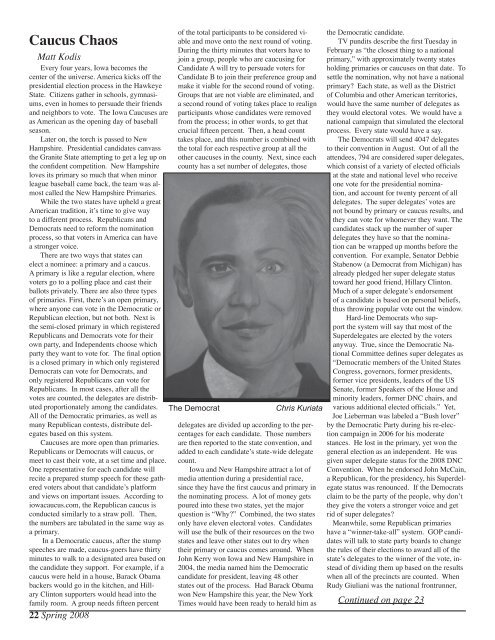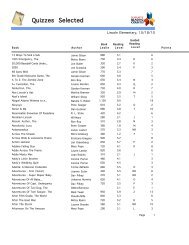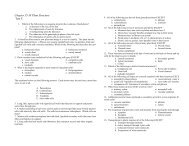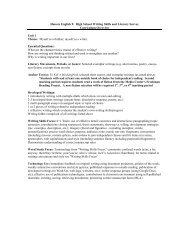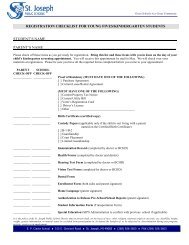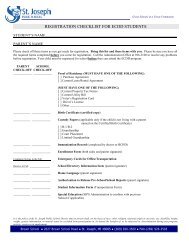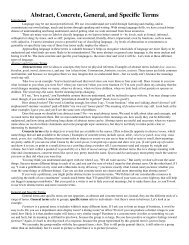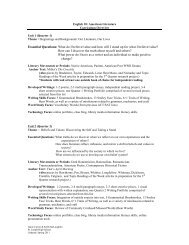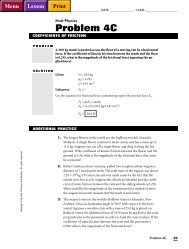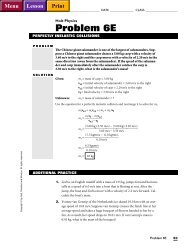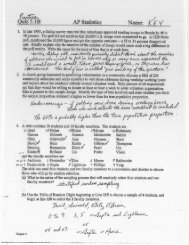Download PDF Version - St. Joseph Public Schools
Download PDF Version - St. Joseph Public Schools
Download PDF Version - St. Joseph Public Schools
You also want an ePaper? Increase the reach of your titles
YUMPU automatically turns print PDFs into web optimized ePapers that Google loves.
Caucus ChaosMatt KodisEvery four years, Iowa becomes thecenter of the universe. America kicks off thepresidential election process in the Hawkeye<strong>St</strong>ate. Citizens gather in schools, gymnasiums,even in homes to persuade their friendsand neighbors to vote. The Iowa Caucuses areas American as the opening day of baseballseason.Later on, the torch is passed to NewHampshire. Presidential candidates canvassthe Granite <strong>St</strong>ate attempting to get a leg up onthe confident competition. New Hampshireloves its primary so much that when minorleague baseball came back, the team was almostcalled the New Hampshire Primaries.While the two states have upheld a greatAmerican tradition, itʼs time to give wayto a different process. Republicans andDemocrats need to reform the nominationprocess, so that voters in America can havea stronger voice.There are two ways that states canelect a nominee: a primary and a caucus.A primary is like a regular election, wherevoters go to a polling place and cast theirballots privately. There are also three typesof primaries. First, thereʼs an open primary,where anyone can vote in the Democratic orRepublican election, but not both. Next isthe semi-closed primary in which registeredRepublicans and Democrats vote for theirown party, and Independents choose whichparty they want to vote for. The final optionis a closed primary in which only registeredDemocrats can vote for Democrats, andonly registered Republicans can vote forRepublicans. In most cases, after all thevotes are counted, the delegates are distributedproportionately among the candidates.All of the Democratic primaries, as well asmany Republican contests, distribute delegatesbased on this system.Caucuses are more open than primaries.Republicans or Democrats will caucus, ormeet to cast their vote, at a set time and place.One representative for each candidate willrecite a prepared stump speech for these gatheredvoters about that candidateʼs platformand views on important issues. According toiowacaucus.com, the Republican caucus isconducted similarly to a straw poll. Then,the numbers are tabulated in the same way asa primary.In a Democratic caucus, after the stumpspeeches are made, caucus-goers have thirtyminutes to walk to a designated area based onthe candidate they support. For example, if acaucus were held in a house, Barack Obamabackers would go in the kitchen, and HillaryClinton supporters would head into thefamily room. A group needs fifteen percent22 Spring 2008of the total participants to be considered viableand move onto the next round of voting.During the thirty minutes that voters have tojoin a group, people who are caucusing forCandidate A will try to persuade voters forCandidate B to join their preference group andmake it viable for the second round of voting.Groups that are not viable are eliminated, anda second round of voting takes place to realignparticipants whose candidates were removedfrom the process; in other words, to get thatcrucial fifteen percent. Then, a head counttakes place, and this number is combined withthe total for each respective group at all theother caucuses in the county. Next, since eachcounty has a set number of delegates, thoseThe DemocratChris Kuriatadelegates are divided up according to the percentagesfor each candidate. Those numbersare then reported to the state convention, andadded to each candidateʼs state-wide delegatecount.Iowa and New Hampshire attract a lot ofmedia attention during a presidential race,since they have the first caucus and primary inthe nominating process. A lot of money getspoured into these two states, yet the majorquestion is “Why?” Combined, the two statesonly have eleven electoral votes. Candidateswill use the bulk of their resources on the twostates and leave other states out to dry whentheir primary or caucus comes around. WhenJohn Kerry won Iowa and New Hampshire in2004, the media named him the Democraticcandidate for president, leaving 48 otherstates out of the process. Had Barack Obamawon New Hampshire this year, the New YorkTimes would have been ready to herald him asthe Democratic candidate.TV pundits describe the first Tuesday inFebruary as “the closest thing to a nationalprimary,” with approximately twenty statesholding primaries or caucuses on that date. Tosettle the nomination, why not have a nationalprimary? Each state, as well as the Districtof Columbia and other American territories,would have the same number of delegates asthey would electoral votes. We would have anational campaign that simulated the electoralprocess. Every state would have a say.The Democrats will send 4047 delegatesto their convention in August. Out of all theattendees, 794 are considered super delegates,which consist of a variety of elected officialsat the state and national level who receiveone vote for the presidential nomination,and account for twenty percent of alldelegates. The super delegatesʼ votes arenot bound by primary or caucus results, andthey can vote for whomever they want. Thecandidates stack up the number of superdelegates they have so that the nominationcan be wrapped up months before theconvention. For example, Senator Debbie<strong>St</strong>abenow (a Democrat from Michigan) hasalready pledged her super delegate statustoward her good friend, Hillary Clinton.Much of a super delegateʼs endorsementof a candidate is based on personal beliefs,thus throwing popular vote out the window.Hard-line Democrats who supportthe system will say that most of theSuperdelegates are elected by the votersanyway. True, since the Democratic NationalCommittee defines super delegates as“Democratic members of the United <strong>St</strong>atesCongress, governors, former presidents,former vice presidents, leaders of the USSenate, former Speakers of the House andminority leaders, former DNC chairs, andvarious additional elected officials.” Yet,Joe Lieberman was labeled a “Bush lover”by the Democratic Party during his re-electioncampaign in 2006 for his moderatestances. He lost in the primary, yet won thegeneral election as an independent. He wasgiven super delegate status for the 2008 DNCConvention. When he endorsed John McCain,a Republican, for the presidency, his Superdelegatestatus was renounced. If the Democratsclaim to be the party of the people, why donʼtthey give the voters a stronger voice and getrid of super delegates?Meanwhile, some Republican primarieshave a “winner-take-all” system. GOP candidateswill talk to state party boards to changethe rules of their elections to award all of thestateʼs delegates to the winner of the vote, insteadof dividing them up based on the resultswhen all of the precincts are counted. WhenRudy Giuliani was the national frontrunner,Continued on page 23


